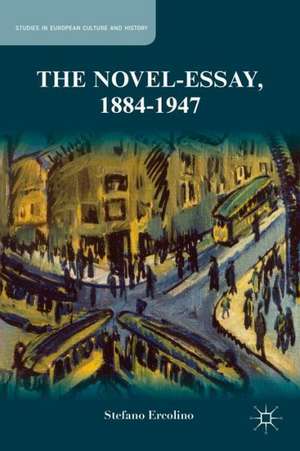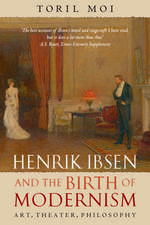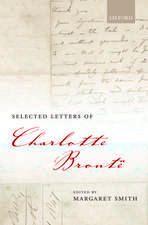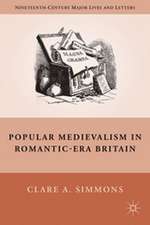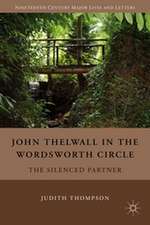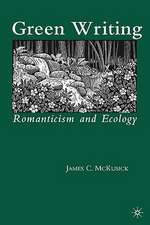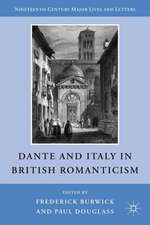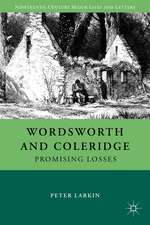The Novel-Essay, 1884-1947: Studies in European Culture and History
Autor S. Ercolinoen Limba Engleză Hardback – 4 apr 2014
| Toate formatele și edițiile | Preț | Express |
|---|---|---|
| Paperback (1) | 382.36 lei 6-8 săpt. | |
| Palgrave Macmillan US – 4 apr 2014 | 382.36 lei 6-8 săpt. | |
| Hardback (1) | 385.84 lei 6-8 săpt. | |
| Palgrave Macmillan US – 4 apr 2014 | 385.84 lei 6-8 săpt. |
Din seria Studies in European Culture and History
-
 Preț: 310.99 lei
Preț: 310.99 lei -
 Preț: 383.93 lei
Preț: 383.93 lei -
 Preț: 389.70 lei
Preț: 389.70 lei -
 Preț: 386.00 lei
Preț: 386.00 lei -
 Preț: 393.52 lei
Preț: 393.52 lei -
 Preț: 381.00 lei
Preț: 381.00 lei - 15%
 Preț: 698.15 lei
Preț: 698.15 lei -
 Preț: 389.88 lei
Preț: 389.88 lei -
 Preț: 390.63 lei
Preț: 390.63 lei -
 Preț: 384.86 lei
Preț: 384.86 lei -
 Preț: 381.00 lei
Preț: 381.00 lei -
 Preț: 388.72 lei
Preț: 388.72 lei -
 Preț: 381.59 lei
Preț: 381.59 lei -
 Preț: 384.86 lei
Preț: 384.86 lei -
 Preț: 385.84 lei
Preț: 385.84 lei -
 Preț: 388.13 lei
Preț: 388.13 lei -
 Preț: 393.52 lei
Preț: 393.52 lei -
 Preț: 385.84 lei
Preț: 385.84 lei -
 Preț: 387.38 lei
Preț: 387.38 lei -
 Preț: 392.60 lei
Preț: 392.60 lei -
 Preț: 389.11 lei
Preț: 389.11 lei - 15%
 Preț: 638.89 lei
Preț: 638.89 lei - 15%
 Preț: 640.06 lei
Preț: 640.06 lei - 15%
 Preț: 697.32 lei
Preț: 697.32 lei -
 Preț: 388.13 lei
Preț: 388.13 lei -
 Preț: 384.86 lei
Preț: 384.86 lei -
 Preț: 389.49 lei
Preț: 389.49 lei -
 Preț: 388.90 lei
Preț: 388.90 lei -
 Preț: 388.72 lei
Preț: 388.72 lei - 15%
 Preț: 643.34 lei
Preț: 643.34 lei -
 Preț: 384.86 lei
Preț: 384.86 lei -
 Preț: 388.13 lei
Preț: 388.13 lei -
 Preț: 388.34 lei
Preț: 388.34 lei -
 Preț: 388.72 lei
Preț: 388.72 lei
Preț: 385.84 lei
Nou
Puncte Express: 579
Preț estimativ în valută:
73.85€ • 76.11$ • 62.35£
73.85€ • 76.11$ • 62.35£
Carte tipărită la comandă
Livrare economică 01-15 martie
Preluare comenzi: 021 569.72.76
Specificații
ISBN-13: 9781137404107
ISBN-10: 1137404108
Pagini: 194
Ilustrații: XIX, 194 p.
Dimensiuni: 140 x 216 x 18 mm
Greutate: 0.36 kg
Ediția:2014
Editura: Palgrave Macmillan US
Colecția Palgrave Macmillan
Seria Studies in European Culture and History
Locul publicării:New York, United States
ISBN-10: 1137404108
Pagini: 194
Ilustrații: XIX, 194 p.
Dimensiuni: 140 x 216 x 18 mm
Greutate: 0.36 kg
Ediția:2014
Editura: Palgrave Macmillan US
Colecția Palgrave Macmillan
Seria Studies in European Culture and History
Locul publicării:New York, United States
Cuprins
Introduction PART I 1. Beyond Naturalist Aesthetics 2. The Critique of Modern Rationality 3. The Emergence of the Novel-Essay PART II 1. A Morphological Changeover 2. Mimicry 3. Dialectical Strains PART III 1. Philosophical Mimesis 2. Totality and the Grand Style 3. The Tear of History PART IV: FORM AND IDEOLOGY Works Cited
Recenzii
"The Novel-Essay is . . . a necessary step not just to understand the crisis of modernity or to study the premises of the ideology of postmodernism it is a chapter of the history of the novel which will allow us to understand the development of our society through the mirror of literary forms." - Los Angeles Review of Books
"Bold and well-argued, Ercolino's book focuses on the novel-essay, a genre that emerged following the great crisis of the epistemological and symbolic apparatuses of modernity . . . An exceptionally gifted specialist in the history and theory of the novel, Ercolino steps forward dauntlessly. His book is compact and dense . . . Ercolino is a scholar of enviable brilliance." - Remo Ceserani, Professor Emeritus of Comparative Literature, University of Bologna, Italy, Alias domenica Il manifesto
"In an unusual combination, Ercolino is highly skilled at both close- and far-reading. His readers will appreciate the book's readable prose, its compressed argumentation, and its smooth synthesis of complex and varied discourses. He deftly analyzes the relationship between the novel-essay and Zolian naturalism, Cartesian rationality, the Bildungsroman, and philosophical mimesis. He demonstrates a deep understanding of the literary and philosophical landscape in modern Europe and includes even the most contemporary literary scholarship, including references to Franco Moretti's collaborative projects at the Stanford Literary Lab. This book is a must-read for specialists of the novel and the essay, and a helpful contribution for historians, philosophers, and cultural critics who focus on modernity and its transition into postmodernity. I anticipate that in our new millennium, Ercolino's will be the first of many upcoming analyses of one of the most fascinating hybrid literary forms to emerge in Europe since the last century. It is refreshing to find a new voice on the touchy question of essayistic fiction, which has been lacking since the illuminating contributions of Thomas Harrison and Claire de Obaldia. Ercolino's wide-ranging analysis delivers what it promises. One could say that he synthesizes major theories of the essay and the novel as separate genres into a new, dialectically integrated theory of the novel-essay, as though the criticism of a hybrid genre must also be hybrid." - Christy Wampole, Princeton University, USA, Modernism/modernity
"Stefano Ercolino's book is a splendid rediscovery of one of the most important modern narrative genres, the novel-essay. By showing how the various authors of novel-essays - J.-K. Huysmans, Marcel Proust, Thomas Mann, Robert Musil and Hermann Broch - propose a wide range of syntheses between thought and action, Ercolino's book offers a nuanced, innovative, and memorable view of modernity itself . . . Ercolino's beautiful, nuanced, and innovative work is one of the most notable recent debuts in literary history." - Thomas Pavel, Gordon J. Laing Distinguished Service Professor in French and Comparative Literature, University of Chicago, USA, Strumenti critici, and author of The Lives of the Novel
"The daring hypothesis of Ercolino's study - which ranges over a half century of literary history, over a half-dozen writers of the likes of Musil, Dostoevsky, Mann, and Huysmans, and over the insights of even more numerous literary theorists - is that the hybrid aesthetics of the novel-essay does not merely enact the symbolic crisis of modernist thinking; it also furnishes the most resounding intellectual reply." - Thomas Harrison, Professor of Italian, University of California, Los Angeles, USA
"The greatest achievement of the [book's] broad-ranging analysis . . . is being able and willing to tackle literary works - even some of the classics of our tradition - within dynamic systems such as genres, through which texts can describe effectively . . . the symbolic changes that took place in society and history." - Guido Mattia Gallerani, ITEM (Institut des textes et manuscrits modernes), ENS-CNRS, France, Between
"Bold and well-argued, Ercolino's book focuses on the novel-essay, a genre that emerged following the great crisis of the epistemological and symbolic apparatuses of modernity . . . An exceptionally gifted specialist in the history and theory of the novel, Ercolino steps forward dauntlessly. His book is compact and dense . . . Ercolino is a scholar of enviable brilliance." - Remo Ceserani, Professor Emeritus of Comparative Literature, University of Bologna, Italy, Alias domenica Il manifesto
"In an unusual combination, Ercolino is highly skilled at both close- and far-reading. His readers will appreciate the book's readable prose, its compressed argumentation, and its smooth synthesis of complex and varied discourses. He deftly analyzes the relationship between the novel-essay and Zolian naturalism, Cartesian rationality, the Bildungsroman, and philosophical mimesis. He demonstrates a deep understanding of the literary and philosophical landscape in modern Europe and includes even the most contemporary literary scholarship, including references to Franco Moretti's collaborative projects at the Stanford Literary Lab. This book is a must-read for specialists of the novel and the essay, and a helpful contribution for historians, philosophers, and cultural critics who focus on modernity and its transition into postmodernity. I anticipate that in our new millennium, Ercolino's will be the first of many upcoming analyses of one of the most fascinating hybrid literary forms to emerge in Europe since the last century. It is refreshing to find a new voice on the touchy question of essayistic fiction, which has been lacking since the illuminating contributions of Thomas Harrison and Claire de Obaldia. Ercolino's wide-ranging analysis delivers what it promises. One could say that he synthesizes major theories of the essay and the novel as separate genres into a new, dialectically integrated theory of the novel-essay, as though the criticism of a hybrid genre must also be hybrid." - Christy Wampole, Princeton University, USA, Modernism/modernity
"Stefano Ercolino's book is a splendid rediscovery of one of the most important modern narrative genres, the novel-essay. By showing how the various authors of novel-essays - J.-K. Huysmans, Marcel Proust, Thomas Mann, Robert Musil and Hermann Broch - propose a wide range of syntheses between thought and action, Ercolino's book offers a nuanced, innovative, and memorable view of modernity itself . . . Ercolino's beautiful, nuanced, and innovative work is one of the most notable recent debuts in literary history." - Thomas Pavel, Gordon J. Laing Distinguished Service Professor in French and Comparative Literature, University of Chicago, USA, Strumenti critici, and author of The Lives of the Novel
"The daring hypothesis of Ercolino's study - which ranges over a half century of literary history, over a half-dozen writers of the likes of Musil, Dostoevsky, Mann, and Huysmans, and over the insights of even more numerous literary theorists - is that the hybrid aesthetics of the novel-essay does not merely enact the symbolic crisis of modernist thinking; it also furnishes the most resounding intellectual reply." - Thomas Harrison, Professor of Italian, University of California, Los Angeles, USA
"The greatest achievement of the [book's] broad-ranging analysis . . . is being able and willing to tackle literary works - even some of the classics of our tradition - within dynamic systems such as genres, through which texts can describe effectively . . . the symbolic changes that took place in society and history." - Guido Mattia Gallerani, ITEM (Institut des textes et manuscrits modernes), ENS-CNRS, France, Between
Notă biografică
Stefano Ercolino is Assistant Professor of Comparative Literature at Underwood International College, Yonsei University, Seoul, Korea. A former Fulbright Scholar at Stanford University, USA, and DAAD Postdoctoral Fellow in the Peter Szondi Institute of Comparative Literature at the Freie Universität Berlin, Germany, he is the author of The Maximalist Novel: From Thomas Pynchon's "Gravity's Rainbow" to Roberto Bolaño's "2666."
